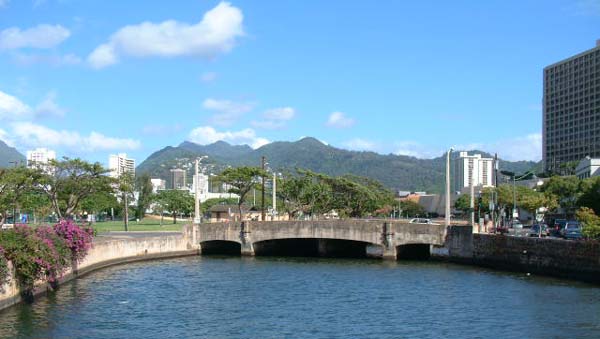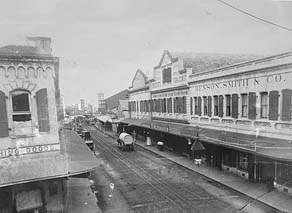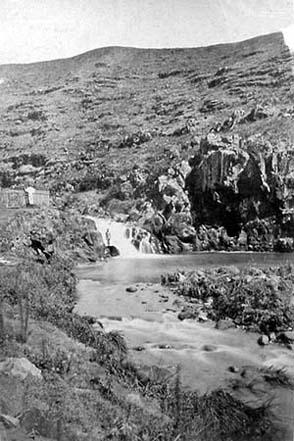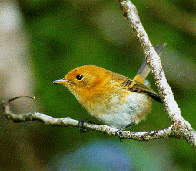 |
 |
 |
|||||||||||||||||||||
|
|
|
|
|
|
|
|
|
||||||||||||||||
|
|
|||||||||||||||||||||||
|
|
|
|
Nu‘uanu Stream at Chinatown, just before it reaches the harbor.
|
|
|
"Ahupua‘a is holistic," Stephen Kubota says, elaborating the vision of the Ahupua‘a Action Alliance: "In Hawaiian culture, you had kahuna who knew the forests, knew the trees, knew the geology. The chiefs could draw upon the collective wisdom of the kahuna to help determine what was an appropriate construction project. Today, I see a modern ahupua‘a. It means using the knowledge and tools we have today. "Some argue that using an ahupua‘a system today poses challenges simply because our society is not organized around subsistence, which was the whole premise of the ahupua‘a system. Others have said, how can you use an ahupua‘a system in modern Hawai‘i when we import 70% of our food? Moreover, the people within the ahupua‘a shared common resources, but today so many of these are now either degraded or sequestered in private lands. "But if we look at the underlying values, principles, and practices, those have not changed. Certain accepted features are retained, even in Western law: water as a public trust resource, public access rights to forest, to hiking, to gathering. Those are acknowledged even in modern Western laws, especially in the State of Hawai‘i."
|
||
|
|
||
|
"The traditional ahupua‘a had certain features, focused on subsistence production. But in the history of the Kingdom, you have the incorporation of outside technologies. Kamehameha took on the tools of guns, metals, sailing ships, to consolidate his kingdom; through Kalakaua’s time, right up through Lili‘uokalani’s time, Hawaiian culture was evolving with the modern technologies. Kalakaua was a man of science: he put electricity in ‘Iolani palace even before the White House had it. "So there’s nothing that I think would hold Hawaiian culture back. Some people say, They’re not going to keep us back with the o‘o [digging stick]. True: we use metal tools, we use irrigation pipes--whatever works. The fact remains, all cultures have that right to evolve. Within the Hawaiian culture there was always a tradition of aloha, which meant accepting new people, new ideas, new tools. Hawaiians were famous for adopting things."
|
|
|
|
"When I say ahupua‘a today, I’m talking about a holistic relationship, a kinship with all the living creatures that occupy the place where you live--including the spirits of the ancestors. There’s no Western term for this concept. There’s a phrase that I’m comfortable with for now, it’s ecosystem restoration, and those two words together carry the meaning. Ecosystem includes humans and all the non-human factors. Restoration is a really important concept because it has become a science, it becomes a policy. And in restoration policy, you are admitting that there was something damaged. "The toolkit for restoration is very clear: you can’t restore if you don’t know what was there before. You have to use historic photographs, oral histories, and research. It's kind of like the doctor-patient relationship: before I prescribe this, I’d better do a patient history to see if you’re tolerant to these drugs. Is it a genetic disorder, or a bacterial infection? We require some very high standards before a doctor prescribes medicine. "I think ecosystem restoration is beginning to impose those kinds of standards on how we manage the environment. You may find that this area was once a taro patch, but because of all the changes, today it's a reservoir. It may be best to leave it as a reservoir."
|
|
|
|
|
"Hawaiians have the most extensive written record of any indigenous peoples because of the nature of the culture, the history of the missionaries, the adoption of a written language, and the establishment of a kingdom that was internationally recognized. So among their government documents, their Hawaiian language newspapers, and their personal archive records, there’s a vast repository. Not only the State Archives, but the personal archives of the Kamehameha Schools, and the Bishop Museum; there are private collections all over the town, some of it in the original Hawaiian language. When the language was banned, those materials were secreted away. "Several people are now looking into how restoration using historical records is something that could really happen in Hawai‘i, because of the extensive documentation that exists. Pacific Worlds is really one of those tools — to bring history to light. To really restore ahupua‘a, we need to be honest in historical research, wade through those layers of history so that we put things in perspective, and build forward from there. Some people call it back to the future.”
|
||
|
|
||
|
"There’s a vision team project that’s trying to do restoration, and they have archaeologists come up here to look at some of the archaeological evidence. And then they have to get the botanists to come up here, to look at the plants. Then the wildlife people. "Last time we were here we saw an ‘elepaio, which is one of the endangered native birds in this area. Pali Highway is right there, and there's urbanization all around. Yet there’s a little niche that the ‘elepaio found here in which it could survive. So even in modern, urbanized Hawai‘i there’s the potential to restore, a bit at a time. It's like the concept of the kipuka: little by little you could restore."
|
O‘ahu elepaio
|
|
|
|
|
"One of the key concepts of in ahupua‘a is malama ‘aina. Malama is an active verb: it means to take care, because your ancestors’ spirits are here. It wasn’t about what is sometimes called conservation which is stay out. A lot of emphasis has been recently placed on gathering rights, but in the Hawaiian ethic, that includes the responsibility to take care. The streams and the trails were laid out in a time when there wasn’t private property, and the water and access to the mountains were guaranteed to all. "Today one of the big challenges with restoring the streams is the encounter with private property. Many groups that want to do stream clean-up have to struggle with the landowner who says, it’s my property, don’t trespass. I don’t want you cleaning up. I own the stream, and I can do what I want. Today the clash between property rights and common ownership is one of the real challenges of restoring ahupua‘a."
|
||
|
|
||
| |
| |
|
|
 |
| Nu‘uanu Home | Map Library | Site Map | Hawaiian Islands Home | Pacific Worlds Home |
|
|
|||
| Copyright 2003 Pacific Worlds & Associates • Usage Policy • Webmaster |
|||








